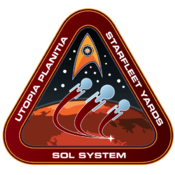Ranger class: Difference between revisions
m (Rich moved page Ranger Class to Ranger class) |
No edit summary |
||
| Line 1: | Line 1: | ||
{{ | {{Utopia Planitia}}__NOTOC__ | ||
{{Explorers}} | |||
*'''Class and Type:''' ''Ranger''-class Explorer | *'''Class and Type:''' ''Ranger''-class Explorer | ||
*'''Commissioning Date:''' 2215 | *'''Commissioning Date:''' 2215 | ||
| Line 19: | Line 20: | ||
{{NC}} | {{NC}} | ||
[[Category:Starfleet ship classes]] | {{Utopia Planitia footer}} | ||
[[Category:Starfleet ship classes|Explorers]] | |||
Revision as of 03:23, 23 November 2014
| Utopia Planitia Fleet Yards |
|---|
|
EXPLORERS
The second of the great exploratory vessels built by Starfleet, the Ranger-class Explorer was the successor to the Daedalus class, and the first ship to employ the new-familiar "saucer section" structure (a shape Starfleet's engineers had determined would allow for the formation of a more stable warp field than the Daedalus' sphere). Its hull, the first ever made of tritanium, was created by the famed Human artist-engineer Mark Chausser working from his laboratory at the University of Oreas on Alpha Centauri IV. Chausser, and the other engineers working on the Ranger Development Project, chose to go a different route than their predecessors had fifty years before with the Daedalus. Based on the latest research, they used the aforementioned saucer as the main hull, then attached the Engineering hull to it dorsally with a short connecting interhull, and installed nacelle pylons projecting slightly ventrally and outward from the ventral side of the saucer. Thus, the ship's configuration essentially reverses what would become Starfleet's standard saucer-hull-pylon design. Although primitive even by the standards of 30 years later (when the Constitution class was launched), and unable to take advantage of the advances in warp technology of 2220, the Ranger nevertheless represented a quantum leap forward from the 22nd century ships in both sophistication and convenience. Featuring new food processing systems, Tesla-class laser cannons, and a host of other new systems, it was, from 2215 to 2245, the most powerful ship the Federation possessed. (A few, including the famed USS Carolina, NCC-1000, remained in service until as late as the early 2270s.) It even had an interior, also designed by Chausser, intended to maximize crew efficiency, comfort, and morale. Noteworhty Vessels/service records/encounters:
|
- Black-and-white ship illustrations by Tim Davies unless otherwise noted. Used with permission. All other images are copyright to their respective owners.
- Black-and-white ship illustrations by Tim Davies unless otherwise noted. Used with permission. All other images are copyright to their respective owners.
| REV SD 239111.23 |
|---|

